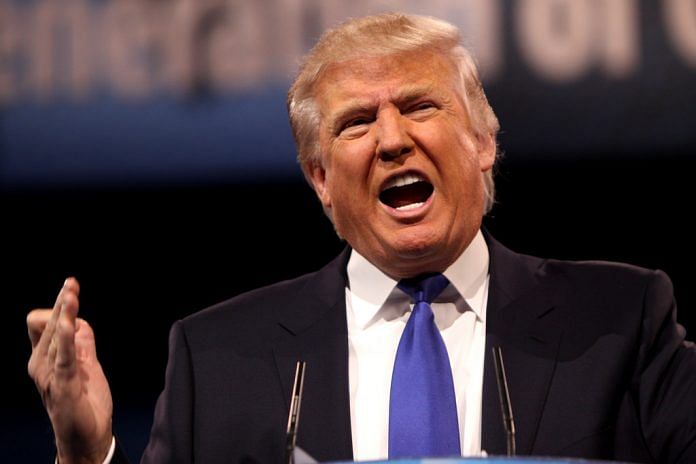Nationalism, nativism and xenophobia are having a rerun across the world. Donald Trump is only the vehicle of that anger. But his impact is not limited to the US. In every Western democracy, Trump has unleashed variations of himself.
The upheaval that makes Trump possible
There is no point predicting a new world order anymore. In his slash-and-burn way, an instinct-driven Trump has already ushered in a new world order – where stupidity and vulgarity are on the march, writes Roger Cohen in Turning Points.
“That the world was ripe for a shake-up has been Donald Trump’s singular intuition and constitutes his singular gamble. A property guy who was raised in New York, he’s used to gambles and a values-free transactional universe. As his company once operated, so he now believes the United States should operate,” Cohen writes.
“The 21st-century world is a pyramid. Wiring everyone together did not so much empower everyone as connect the elites at the summit, the guys who had the view of everything and the means to turn what they saw into a geyser of cash. Busy with all that, sure of themselves, operating globally, benefiting from cheap labor and tax-lite impunity, they scarcely noted that they no longer had much connection with the masses below, whose view was still national, whose culture was still local, and who dimly suffered, with mounting anger, the transformative consequences of globalisation.
Trump saw that he could be the vehicle of that anger.”
“Of course, Trump’s reactionary politics do little or nothing for his white blue-collar constituency. What he offers is spectacle. This is the potent lifeblood of his movement: the appearance of action. Statesmanship is such a quaint word because spectacle has replaced it.”
Is Zia-ul-Haq’s Pakistan a mirror image of Donald Trump’s America?
Pakistan’s bloody political history unleashed by Zia-ul-Haq could have a lesson for Donald Trump’s America. “Trump is leading America down a dangerous path. My birth country of Pakistan offers an image of the consequences of the incitement of anti-Muslim hatred — and it isn’t pretty,” writes Qasim Rashid in the Washington Post.
“Pakistani President Mohammed Zia ul-Haq executed a military coup to come to power. Among his first actions, Zia signed an executive order targeting Pakistan’s Ahmadiyya Muslim minority — to which we belonged — prescribing fines, arrest and even death should we dare practice our faith. Zia hijacked media to claim Ahmadis hated Pakistan. He called us a ‘cancer’ and accused us of spreading false information even as he shut down our mosques and schools.”
“Just as Zia refused to condemn right-wing Muslim extremism, the American president refuses to condemn right-wing white supremacy. One study concluded that white supremacists radicalized online grew by 600 percent since 2012 alone, outperforming the Islamic State. Just as Pakistani media remained silent on the persecution of Ahmadi Muslims, American media reports on terrorism done by Muslims at a rate of five times that of terrorism done by non-Muslims — while largely ignoring the epidemic threat of right-wing extremism.”
A curious ally in China’s propaganda wars – the country’s private sector
China, for all its communist rhetoric, has always been a curious melting point for communist values and the private sector. Turns out, the private sector is also helping China to modernise propaganda, writes The Economist.
“The Communist Party’s publicists, though powerful and feared, are not known for their skill in winning audiences. Their output for cinema and television is often ridiculed (albeit discreetly) as wooden, out of touch and simply not believable.”
“The private sector has had better luck. In recent years non-state firms have been churning out works that have the kind of impact the party craves. The goal of such businesses is to make money, not to create propaganda for its own sake. But to survive they need to stay in the party’s good books. So they have found ways of producing pro-party entertainment that is popular. A common technique is appealing to youthful patriotism.”
“The party can take some credit for the success of such entertainment. It cultivates the nationalism that feeds it; for example, by promoting ‘patriotic education’ in schools. Censors tilt the playing field by blocking Hollywood films when their release might tempt audiences away from favoured home-grown ones. They also ban anything that they deem to be unpatriotic—including anything critical of the party. No matter what accounts for the recent success of main melody works, official propagandists can take it easy. The private sector is helping them do their work, and making big money from it.”
Beijing needs to stop throwing out its migrants
China wants an overcrowded Beijing to turn into a liveable, international city. Fair enough. But in the hands of the city’s municipal authorities – which lack awareness of basic human rights – this endeavour has turned into a campaign to evict the migrants, writes Deng Yuwen in South China Morning Post.
“The authorities introduced a raft of stringent measures in recent years to force ‘foreigners’ out of the capital. These include strictly controlling the increase of housing units, banning the group-leasing of properties, shutting down markets for low-end consumer goods, and raising the entry bar for children of non-native residents seeking an education. Meanwhile, migrants became known not just as ‘foreigners’, but also ‘low-quality population’ and “low-end population”.
“This is what we’re seeing in the wake of the fire in Daxing district two weeks ago. Tenants were told to leave within days, despite the cold weather, and given no resettlement plans and no compensation.”
“Their eviction reflects two related problems: the backwardness of China’s urban management, and the dangers of a political system in which those who are tasked with execution blindly follow orders to meet certain policy objectives.
“Municipal authorities must update their backward thinking. Otherwise, more large-scale evictions will happen.”
Moreover, “Beijing is often held up as a role model for other Chinese cities. Therefore, it must be persuaded to stop this damaging campaign to clear out migrants.”



